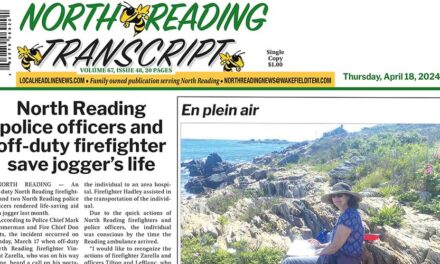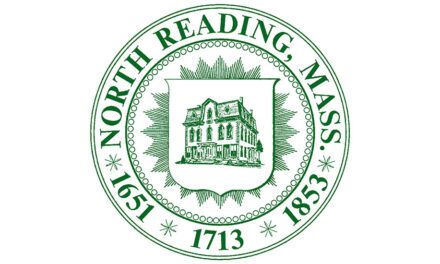POSTED Friday, May 22, 2020 at 6 a.m.
NORTH READING — As of Thursday, May 21, the Massachusetts Department of Public Health (MDPH) has notified the town of 183 total cases of COVID-19 affecting North Reading to date, including 119 residents and 64 patients at or associated with the Royal Meadow View nursing and rehabilitation center.
Of this combined total, 99 patients have recovered and the North Reading Health Department continues to monitor 70 patients. A total of 13 people with confirmed cases of COVID-19, including 12 at or associated with Royal Meadow View nursing and rehabilitation center, have died, and one person suspected of having COVID-19 has died.
Following Gov. Baker’s announcement on Monday, May 18 of a four-part phased re-opening of businesses, parks and places people gather, the town has adjusted its policy on activities which may take place, effective immediately, at its public park and recreation facilities, with social distancing restrictions in effect requiring individuals to be six feet or more away from each other and in groups of no more than 10 people. (If six-feet of separation cannot be maintained, facial coverings shall be worn by those over age 2.)
• Ipswich River Park – walking paths, boat launch, and fishing areas only
• Arthur J. Kenney Field – track only
• Eisenhaure Pond Park – walking paths and fishing area only
• Clarke Park at Martin’s Pond – walking path and fishing area only
Additionally, the following park amenities are anticipated to reopen on a staggered basis on Tuesday, May 26, with state guidelines in effect:
• Athletic fields
• Tennis courts
• Skate park at Ipswich River Park
• Basketball courts
• Street hockey rink at Ipswich River Park
The town has decided that its restrooms, picnic areas and playground facilities will remain closed at this time. Such discretion is left to the cities and towns.
Specific guidance will be posted on site, however general state guidelines may be found here: https://www.mass.gov/doc/parks-open-space-and-outdoor-education-best-practices-5-18-20/download.
STATE’S REOPENING STANDARDS FOR PARKS, OPEN SPACE AND OUTDOOR EDUCATION
The following guidelines apply to parks, open space and outdoor education programs during Phase 1 of the commonwealth’s reopening, effective May 18 until amended or rescinded.
All visitors to parks and open space, and managers associated with properties or activities at such places, should abide by the specific guidelines outlined below:
• Property-specific guidelines should be posted at entrance points to areas and on relevant social media/websites.
• These guidelines apply to all parks, reservations and open spaces unless otherwise specified.
This guidance should apply until amended or rescinded. Any questions regarding this guidance can be sent to: outdoor.recreation@mass.gov
DPH ORDERS AND GUIDELINES
• Face coverings and masks: All visitors to parks and open space, as well as those participating in outdoor education programs should comply with COVID-19 Order 31: “Order requiring face coverings in public places where social distancing is not possible.”
The order requires any person over the age of 2, whether indoors or outdoors, to wear a face covering or mask when they cannot maintain six feet of distance between themselves and others, unless they have a medical condition preventing them from doing so (see further guidance here:
https://www.mass.gov/info-details/covid-19-state-of-emergency.
• Group size: No groups larger than 10 are allowed to gather: https://www.mass.gov/doc/march31-2020-assemblage-guidance/download
PARKS AND OPEN SPACE
Walking, hiking, biking, running and other activities (yoga, tai chi, etc.,) are allowable activities in parks and other designated areas, such as rail trails, multi-use paths and bike paths.
Parks and open space guidelines:
• Visitors should always practice social distancing by remaining six feet away from others and adhering to all site-specific rules, regulations, and posted signage regarding permitted uses.
• On trails, walker and hikers should move aside and leave room for others to pass, and cyclists and runners should alert other users when approaching and wait for others to step aside before passing.
• After visiting public spaces, users should use wash their hands or use hand sanitizer.
Athletic fields and non-contact courts (non-organized/permitted use):
Athletic fields and athletic courts can be utilized only for non-contact sports, with no shared equipment, such as tennis and pickleball.
No permits should be issued for group gatherings and users should not engage in pick-up games, organized games or tournaments.
Athletic fields guidelines:
• Users should sanitize hands before and after play, not share equipment, and clean and wipe down equipment.
• When engaged in play, users should avoid touching other users’ equipment in separate areas.
• Users waiting to utilize a section or area of the field should wait outside the field of play until previous users have vacated the facility to ensure proper social distancing and prevent accidental contact of other users’ equipment.
• Users should not engage in pick-up games, organized games or tournaments.
Athletic courts (non-contact) guidelines:
• Users should sanitize hands before and after play, not share equipment, and clean and wipe down equipment, including racquets, balls and water bottles.
• Users waiting to utilize a court should wait outside the court’s gates/fence until previous users have vacated the facility to ensure proper social distancing and prevent accidental contact of other users’ equipment.
• Users should not engage in pick-up games, organized games or tournaments
Picnic areas and grills:
Picnic and grill areas should be closed if social distancing cannot be maintained and sanitizing protocols cannot be performed between use.
TRASH DISPOSAL AND PUBLIC RESTROOMS
Where available, trash disposal and restrooms facilities should be available for public use.
Trash disposal and restrooms at parks, reservations and open space managed by municipalities or other organizations for public use is available to the discretion of the city or town it is in and/or the managing organization.
Trash disposal general guidelines:
• Visitors of public parks, reservations, and open spaces should expect limited or no trash disposal receptacles.
• When visiting public properties without trash receptacles, visitors should adhere to a strict “carry in, carry out” policy and take waste with them.
• Where trash receptacles are available for normal use, park managers should, where feasible, provide no touch, lidless trashcans.
Public restrooms general guidelines:
• Users should abide by social distancing standards for bathroom lines and follow any established visual guidelines for maintaining a six-foot distance in all restroom facilities.
• In advance of the initial opening of public restrooms, the managing entity should adhere to the Centers for Disease Control and Prevention (CDC) guidelines pertaining to the cleaning and disinfection standards of operating procedures for interior spaces and that social distancing can be maintained.
• The managing entity should have the facilities cleaned at least once daily by staff and perform deep cleaning and disinfection services at least once per week and should follow the EEA COVID-19 “Outdoor recreation facility restroom cleaning best practices.”
• Composting (clivus or similar) toilets should be permanently closed and should be replaced with temporary (seasonal) portable restrooms with daily cleanings.
• Restroom facilities should contain hand washing and/or sanitizer stations, and the public should use these stations following the use of the facilities.
Non-commercial dog walking and dog parks
Non-commercial dog-walking and dog parks are allowable activities to the extent allowed by the managing entity.
Non-commercial dog walking guidelines:
• All dog walkers and their dogs should practice social distancing, and users should provide appropriate space for others and/or their dogs to pass when necessary.
• Social distancing for dogs means that dogs not part of the same household should be kept at least six feet apart and avoid interacting with other dogs and other people from separate households.
• Dog walkers should not share toys, treats or other materials with dogs that are not within the same household.
• Dog walkers should supply their own bags associated with dog waste in the event there are none available on-site and remove dog and other waste and dispose of it either in a designated receptacle on site or at another appropriate location.
• Dog walkers should supply their own water and other needs for their pets in the event there are none available on site.
Dog park guidelines:
• All users of dog parks and their dogs should practice social distancing of at least six or more feet.
• All visitors of dog parks should maintain enough control over their pets via leash or voice control to comply with social distancing guidelines and site-specific rules and regulations.
• Dog park amenities, including shared water dishes, toys and other materials should not be used by dogs or handled by visitors.
• Visitors of dog parks should supply their own bags associated with dog waste in the event there are none available onsite and take dog waste with them if designated trash receptacles are not available for normal use.
• Property managers, where feasible, if trash is available, should provide no-touch, lidless trash cans.
Community gardens
Community gardens, and associated activities, are permissible to the extent allowed by the managing entity.
Community garden guidelines:
• Users of community gardens should follow social distancing guidelines and should avoid utilizing communal tools, hoses and other equipment, and avoid the sharing of personal equipment whenever possible. Additionally, users are responsible for sanitizing items before and after each use.
• Community garden users should only visit and utilize plots with members of the same household if social distancing cannot be maintained.
• If crowding becomes an issue, community garden committees and property managers should create a schedule to avoid crowding of individual plot users and maintenance of social distancing protocols.
Outdoor education programs
Organized educational programs, activities and outdoor public art installations may occur in outdoor spaces during Phase 1 only if the program does not require individual participants to share equipment or make physical contact in order to engage in the activity, subject to the following guidelines.
Outdoor education program guidelines:
• To allow for adequate social distancing for the activity, as well as ingress and egress, the layout of the class should be managed to accommodate a minimum of 12-foot distance between each individual activity station.
• Facial coverings are required, and instructor and participants must always comply with all social distancing requirements and remain six-feet apart. Programs must be conducted without shared equipment, tools or materials.
• Activities must be limited to gatherings of no more than 10, including instructor or leader.
• Organizers must use a pre-registration process to ensure group size.
• Instructors must be familiar with all protocols and procedures to maintain a safe activity, e.g. monitoring physical distancing, not allowing participants without facial coverings, disinfecting tables before and after use in accordance with CDC guidelines.
• Temporary signage will be posted to inform the public of public health guidelines and standards of behavior during program.
• If using outdoor displays or tables, add protective barriers, when possible and/or disinfect before and after use.
The town’s previous COVID-19 updates may be found by visiting: https://www.northreadingma.gov/home/news/town-north-reading-coronavirus-covid-–-19-information





